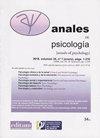Trait emotional intelligence as buffer of mood of in-service and pre-service teachers of preschool and elementary education during the impact of COVID-19
IF 1.3
4区 心理学
Q3 PSYCHOLOGY
引用次数: 0
Abstract
Background: Trait Emotional Intelligence (EI) is a personal characteristic that can act as a buffer factor against vital challenging circumstances and be a predictor of mood in a variety of natural situations such as those derived from the social context of the COVID-19 pandemic. The general aim of this research was to study the relationship between trait EI and teacher moods during confinement. Method: The study included 478 participants, 316 Preschool teachers and Elementary teachers from public centers in the Region of Murcia and 162 university students of Preschool and Elementary education degrees. The instrument used to assess trait EI was the TEIQue-SF; to assess the moods experienced during the impact of COVID-19, a short version of the POMS was used. Results: Teachers with high trait EI were perceived to be more energized and kinder, as well as less nervous, moody, sad and tired, just the opposite pattern of teachers with a low trait EI profile. In addition, female teachers obtained higher scores in negative mood states. Conclusions: Although the study is correlational, the results support the idea of trait EI as a protective factor against stress, which reinforces its role as a promoter of teacher well-being. Antecedentes: La Inteligencia Emocional (IE) rasgo es una característica personal que puede actuar como factor protector contra circunstancias vitales desafiantes y ser un predictor del estado de ánimo en situaciones naturales como las derivadas del contexto social de la pandemia COVID-19. El objetivo general fue estudiar la relación entre IE rasgo y los estados anímicos docentes durante el confinamiento. Método: Se contó con 478 participantes, 316 docentes de Educación Infantil (EI) y Primaria (EP) de centros públicos de la Región de Murcia y 162 estudiantes de los Grados de EI y EP. Los instrumentos empleados fueron: para evaluar la IE rasgo, el TEIQue-SF; para evaluar los estados de ánimo vividos durante el impacto de la COVID-19 se utilizó una versión breve del POMS. Resultados: Los docentes con IE elevada se percibieron más enérgicos y considerados con los demás; así como menos nerviosos, malhumorados, tristes y cansados, justo el patrón contrario al de docentes con perfil de IE baja. Además, las maestras obtienen puntuaciones mayores en los estados emocionales negativos. Conclusiones: Si bien el estudio es correlacional, los resultados avalan la idea de la IE rasgo como factor protector frente al estrés, lo que refuerza su papel como promotor del bienestar docente.新冠肺炎影响下学前教育和小学教育在职教师和职前教师情绪的缓冲因素
背景:特质情感智力(AI)是一种个人特征,可以作为应对重大挑战环境的缓冲因素,并可以预测各种自然情况下的情绪,例如来自新冠疫情社会背景的情绪。这项研究的总体目的是研究监禁期间Trait EI与教师情绪之间的关系。方法:研究对象包括穆尔西亚地区公立中心的478名参与者、316名学前教师和小学教师以及162名学前和小学教育程度的大学生。用于评估Trait EI的仪器是TEIQ-SF;为了评估新冠病毒影响期间的情绪,使用了POMS的简短版本。结果:高EI特征的教师被认为更有活力、更善良,也不那么紧张、喜怒无常、悲伤和疲惫,这与低EI特征的教师的模式正好相反。此外,女教师在消极情绪状态下得分较高。结论:虽然这项研究是相关的,但结果支持将EI作为一种抗压力的保护因素的想法,这加强了它作为教师福祉促进者的作用。背景:情绪智力(IE)特征是一种个人特征,可以作为应对挑战性生活环境的保护因素,并在自然情况下预测情绪,例如来自新冠疫情社会背景的情绪。总体目标是研究禁闭期间特质IE与教学情绪状态之间的关系。方法:共有478名参与者,穆尔西亚地区公立学校的316名幼儿和小学教师,162名幼儿和小学年级学生。使用的工具是:评估特质IE、TEIQ-SF;为了评估新冠病毒影响期间的情绪,使用了POMS的简短版本。结果:IE水平高的教师对他人更有活力和体贴;除了不那么紧张、脾气暴躁、悲伤和疲劳外,这正是IE低知名度教师的模式。此外,女教师在消极情绪状态下的得分更高。结论:虽然这项研究是相关的,但结果支持了特质IE作为压力保护因子的想法,这加强了其作为教师福祉促进者的作用。
本文章由计算机程序翻译,如有差异,请以英文原文为准。
求助全文
约1分钟内获得全文
求助全文
来源期刊

Anales De Psicologia
医学-心理学
CiteScore
3.30
自引率
5.90%
发文量
57
审稿时长
4-8 weeks
期刊介绍:
Anales de Psicologia / Annals of Psychology is a multidisciplinary journal of the various thematic areas of scientific psychology. It publishes original research articles and theoretical review in any of its basic, applied and methodological areas included within psychology.
Publishing, financing, marketing and distribution corresponds Editum: Editions of the University of Murcia (Spain). The organizational guidelines and editorial policies come from the Editorial Team (elected for four years by the Areas and / or Departments of Psychology at the University of Murcia) and the Editorial Board, composed of scholars and experts from different universities and institutions national and international. It is published in print (ISSN: 0212-9728) since 1984 and in Internet publishing (web) (ISSN: 1695-2294) since 2000. Available online full text in pdf from the vol. 1 1984.
Anales de Psicologia / Annals of Psychology maintains a system of exchange with other journals and publications of psychology in the world. Through an free exchange agreement with their respective publishers or entities responsible for editing, these journals and publications are received at the University of Murcia (Biblioteca "Luis Vives", near the Faculty of Psychology) and in return, our journal is sent to libraries and educational and research institutions such centers responsible for editing.
 求助内容:
求助内容: 应助结果提醒方式:
应助结果提醒方式:


